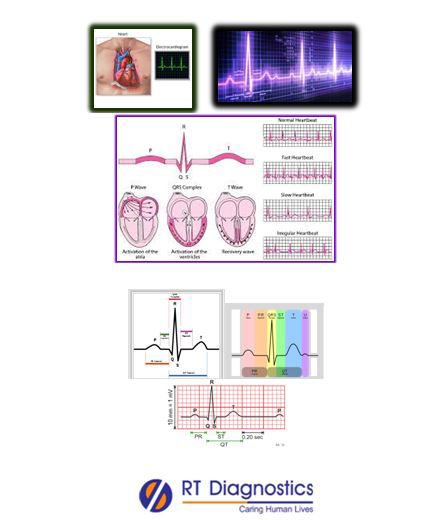ECG:
Why ECG Test?
CLINICAL INFORMATION
An ECG –Electrocardiogram (also denoted as EKG) is the simplest and fastest test that records the electrical signals (through electrodes also called EKG Sensors) from the heart. During an ECG, 12 electrodes (sticky or adhesive patches with lead wires that connect to a monitor) will be attached to your chest and limbs – 3 Leads in the coronal or vertical plane and 6 Precordial leads (chest leads) i.e Transverse or horizontal plane, (forming an Einthoven’s Triangle), which records the signals of the heartbeat (steady or irregular). The overall magnitude of the heart’s electrical potential is measured (in 12 different angles or leads). A computer records the information and displays it as a wave pattern on the monitor (continuous ECG Monitoring) or as a printout on a graph paper sheet – with a background grid (recorded as short intermittent tracing). This test is performed in a hospital (especially in Cardiology wards) – for screening and to assess diseases related to heart ailments, Clinic or Doctor’s office, and also ECG apparatus are standard equipment in ambulances and operating rooms. ECG is a non-invasive, painless way to help diagnose heart disorders in patients of all ages. ECG looks (to evaluate heart function) for heart impulse (strength and timing eg. Strength of electrical signal and its duration), Heart rate, heart rhythm, heart attack, irregular heartbeat (ECG identifies irregular heartbeat and also the cause behind it), inadequate blood and oxygen supply to the heart (Myocardial infarction – ST elevated MI or Non-ST elevated MI), structural abnormalities (like thickened heart muscle), etc. Any change in normal ECG pattern may be a sign of heart-related ill-conditions (eg Cardiac Arrhythmias like Bradycardia – heart rate below normal or Tachycardia – heart rate above normal). ECG is used for flutters, arrhythmias – atrial and ventricular (abnormal heart rhythm especially atrial fibrillation and ventricular tachycardia), Coronary artery disease (narrowed arteries that supply blood to the heart), to check the implanted pacemaker function or also to detect faults in prosthetics like a pacemaker (malfunctioning), heart attacks (assess its incidence), endocarditis (inflammation of the heart eg. Rheumatic fever / Rheumatic heart disease due to untreated Streptococcal infection), to determine the condition of the heart before surgery, perioperative monitoring (monitor anaesthesia) and for prognosis (after heart surgery or cardiac catheterization) or monitoring of medication eg. Drug-induced QT prolongation, Digoxin toxicity, Tricyclic overdose etc. Signs and Symptoms for the need of ECG include palpitations (suddenly noticeable heartbeats), chest pain (ECG evaluates the cause of chest pain), dizziness, fainting, seizures, rapid pulse, murmurs, shortness of breath on exertion etc. Additional tests include electrolyte abnormalities (eg. Very high or low levels of calcium or potassium especially hypokalemia or hyperkalemia), ECHO (for abnormal ECG test result patterns) etc. Treatment (such as a coronary angiogram) depends upon the diagnosis made from the and clinical Examinations (Inspect, palpate and Auscultate), and other assessments by tests such as ECG, ECHO, MRI, Nuclear Cardiac Stress Test – Exercise Thallium Scan, Coronary Computed Tomography Angiogram, Exercise stress test, specialized tests - biochemical tests like BNP, Cardiac Troponin (Troponin-T), CK, CKMB, Myoglobin etc (as supporting evidence for confirmation to arrive at a definitive diagnosis).

General Instructions:
Sample Requirement: Specimen –None. Test Preparation: As guided by the physician.
NOTE - Sample for specimen collections may vary based on the patient’s condition/cases according to the patient’s presenting complaints/signs or symptoms:
SPECIMEN REQUIREMENT (Special or Rare Cases) - As instructed and guided by Physician / Clinician / Pathologist / as per Laboratory’s requirements, according to procedures and protocols.
This Multi-Specialty Clinical Referral Laboratory RTDIAGNOSTICS provides precise and accurate tests with an extensive range of testing services to the medical centres to help in the diagnosis and identification of pathology in the test specimens for infectious diseases and also to evaluate the function of organ systems of the patient. It prevents further complications and helps to stabilize and restore health to near normalcy at the earliest without delay.



